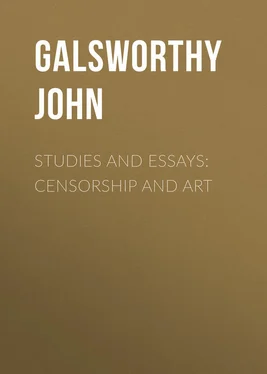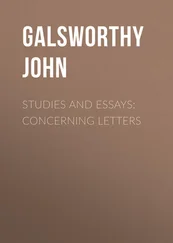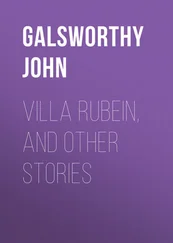John Galsworthy - Studies and Essays - Censorship and Art
Здесь есть возможность читать онлайн «John Galsworthy - Studies and Essays - Censorship and Art» — ознакомительный отрывок электронной книги совершенно бесплатно, а после прочтения отрывка купить полную версию. В некоторых случаях можно слушать аудио, скачать через торрент в формате fb2 и присутствует краткое содержание. Жанр: foreign_antique, foreign_prose, на английском языке. Описание произведения, (предисловие) а так же отзывы посетителей доступны на портале библиотеки ЛибКат.
- Название:Studies and Essays: Censorship and Art
- Автор:
- Жанр:
- Год:неизвестен
- ISBN:нет данных
- Рейтинг книги:3 / 5. Голосов: 1
-
Избранное:Добавить в избранное
- Отзывы:
-
Ваша оценка:
- 60
- 1
- 2
- 3
- 4
- 5
Studies and Essays: Censorship and Art: краткое содержание, описание и аннотация
Предлагаем к чтению аннотацию, описание, краткое содержание или предисловие (зависит от того, что написал сам автор книги «Studies and Essays: Censorship and Art»). Если вы не нашли необходимую информацию о книге — напишите в комментариях, мы постараемся отыскать её.
Studies and Essays: Censorship and Art — читать онлайн ознакомительный отрывок
Ниже представлен текст книги, разбитый по страницам. Система сохранения места последней прочитанной страницы, позволяет с удобством читать онлайн бесплатно книгу «Studies and Essays: Censorship and Art», без необходимости каждый раз заново искать на чём Вы остановились. Поставьте закладку, и сможете в любой момент перейти на страницу, на которой закончили чтение.
Интервал:
Закладка:
John Galsworthy
Studies and Essays: Censorship and Art
ABOUT CENSORSHIP
Since, time and again, it has been proved, in this country of free institutions, that the great majority of our fellow-countrymen consider the only Censorship that now obtains amongst us, namely the Censorship of Plays, a bulwark for the preservation of their comfort and sensibility against the spiritual researches and speculations of bolder and too active spirits – it has become time to consider whether we should not seriously extend a principle, so grateful to the majority, to all our institutions.
For no one can deny that in practice the Censorship of Drama works with a smooth swiftness – a lack of delay and friction unexampled in any public office. No troublesome publicity and tedious postponement for the purpose of appeal mar its efficiency. It is neither hampered by the Law nor by the slow process of popular election. Welcomed by the overwhelming majority of the public; objected to only by such persons as suffer from it, and a negligible faction, who, wedded pedantically to liberty of the subject, are resentful of summary powers vested in a single person responsible only to his own 'conscience' – it is amazingly, triumphantly, successful.
Why, then, in a democratic State, is so valuable a protector of the will, the interests, and pleasure of the majority not bestowed on other branches of the public being? Opponents of the Censorship of Plays have been led by the absence of such other Censorships to conclude that this Office is an archaic survival, persisting into times that have outgrown it. They have been known to allege that the reason of its survival is simply the fact that Dramatic Authors, whose reputation and means of livelihood it threatens, have ever been few in number and poorly organised – that the reason, in short, is the helplessness and weakness of the interests concerned. We must all combat with force such an aspersion on our Legislature. Can it even for a second be supposed that a State which gives trial by Jury to the meanest, poorest, most helpless of its citizens, and concedes to the greatest criminals the right of appeal, could have debarred a body of reputable men from the ordinary rights of citizenship for so cynical a reason as that their numbers were small, their interests unjoined, their protests feeble? Such a supposition were intolerable! We do not in this country deprive a class of citizens of their ordinary rights, we do not place their produce under the irresponsible control of one not amenable to Law, by any sort of political accident! That would indeed be to laugh at Justice in this Kingdom! That would indeed be cynical and unsound! We must never admit that there is no basic Justice controlling the edifice of our Civic Rights. We do, we must, conclude that a just and well-considered principle underlies this despotic Institution; for surely, else, it would not be suffered to survive for a single moment! Pom! Pom!
If, then, the Censorship of Plays be just, beneficent, and based on a well-considered principle, we must rightly inquire what good and logical reason there is for the absence of Censorship in other departments of the national life. If Censorship of the Drama be in the real interests of the people, or at all events in what the Censor for the time being conceives to be their interest – then Censorships of Art, Literature, Religion, Science, and Politics are in the interests of the people, unless it can be proved that there exists essential difference between the Drama and these other branches of the public being. Let us consider whether there is any such essential difference.
It is fact, beyond dispute, that every year numbers of books appear which strain the average reader's intelligence and sensibilities to an unendurable extent; books whose speculations are totally unsuited to normal thinking powers; books which contain views of morality divergent from the customary, and discussions of themes unsuited to the young person; books which, in fine, provide the greater Public with no pleasure whatsoever, and, either by harrowing their feelings or offending their good taste, cause them real pain.
It is true that, precisely as in the case of Plays, the Public are protected by a vigilant and critical Press from works of this description; that, further, they are protected by the commercial instinct of the Libraries, who will not stock an article which may offend their customers – just as, in the case of Plays, the Public are protected by the common-sense of theatrical Managers; that, finally, they are protected by the Police and the Common Law of the land. But despite all these protections, it is no uncommon thing for an average citizen to purchase one of these disturbing or dubious books. Has he, on discovering its true nature, the right to call on the bookseller to refund its value? He has not. And thus he runs a danger obviated in the case of the Drama which has the protection of a prudential Censorship. For this reason alone, how much better, then, that there should exist a paternal authority (some, no doubt, will call it grand-maternal – but sneers must not be confounded with argument) to suppress these books before appearance, and safeguard us from the danger of buying and possibly reading undesirable or painful literature!
A specious reason, however, is advanced for exempting Literature from the Censorship accorded to Plays. He – it is said – who attends the performance of a play, attends it in public, where his feelings may be harrowed and his taste offended, cheek by jowl with boys, or women of all ages; it may even chance that he has taken to this entertainment his wife, or the young persons of his household. He – on the other hand – who reads a book, reads it in privacy. True; but the wielder of this argument has clasped his fingers round a two-edged blade. The very fact that the book has no mixed audience removes from Literature an element which is ever the greatest check on licentiousness in Drama. No manager of a theatre, – a man of the world engaged in the acquisition of his livelihood, unless guaranteed by the license of the Censor, dare risk the presentment before a mixed audience of that which might cause an 'emeute' among his clients. It has, indeed, always been observed that the theatrical manager, almost without exception, thoughtfully recoils from the responsibility that would be thrust on him by the abolition of the Censorship. The fear of the mixed audience is ever suspended above his head. No such fear threatens the publisher, who displays his wares to one man at a time. And for this very reason of the mixed audience; perpetually and perversely cited to the contrary by such as have no firm grasp of this matter, there is a greater necessity for a Censorship on Literature than for one on Plays.
Further, if there were but a Censorship of Literature, no matter how dubious the books that were allowed to pass, the conscience of no reader need ever be troubled. For, that the perfect rest of the public conscience is the first result of Censorship, is proved to certainty by the protected Drama, since many dubious plays are yearly put before the play-going Public without tending in any way to disturb a complacency engendered by the security from harm guaranteed by this beneficent, if despotic, Institution. Pundits who, to the discomfort of the populace, foster this exemption of Literature from discipline, cling to the old-fashioned notion that ulcers should be encouraged to discharge themselves upon the surface, instead of being quietly and decently driven into the system and allowed to fester there.
The remaining plea for exempting Literature from Censorship, put forward by unreflecting persons: That it would require too many Censors – besides being unworthy, is, on the face of it, erroneous.
Читать дальшеИнтервал:
Закладка:
Похожие книги на «Studies and Essays: Censorship and Art»
Представляем Вашему вниманию похожие книги на «Studies and Essays: Censorship and Art» списком для выбора. Мы отобрали схожую по названию и смыслу литературу в надежде предоставить читателям больше вариантов отыскать новые, интересные, ещё непрочитанные произведения.
Обсуждение, отзывы о книге «Studies and Essays: Censorship and Art» и просто собственные мнения читателей. Оставьте ваши комментарии, напишите, что Вы думаете о произведении, его смысле или главных героях. Укажите что конкретно понравилось, а что нет, и почему Вы так считаете.












